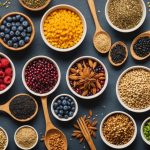Essential Nutritional Guidance for Pregnant Women Over 40 in the UK: Meeting Unique Dietary Needs
Being pregnant over 40 can be a thrilling yet challenging experience, especially when it comes to meeting the unique dietary needs that support both the mother’s health and the baby’s development. In this article, we will delve into the critical nutritional guidance that pregnant women over 40 in the UK should follow to ensure a healthy pregnancy.
Understanding the Nutritional Needs During Pregnancy
Pregnancy is a time of significant physiological changes, and nutritional needs increase to support the growth of the fetus, the expansion of maternal tissues, and the preparation for lactation. Here are some key nutrients that are particularly important:
Also to discover : Discovering the Ideal Daily Workout Routine for Expecting Mothers in the UK: A Guide for the First Trimester
Iron
Iron is crucial during pregnancy due to the expansion of maternal red blood cell mass and the needs of the fetus. Pregnant women require about 27 mg of iron per day, which is significantly higher than the 8 mg needed by non-pregnant women.
- Sources of Iron: Heme iron from lean meat, seafood, and poultry is more bioavailable than nonheme iron from plant-based foods. However, vegetarians need 1.8 times more iron due to the lower bioavailability of nonheme iron.
- Supplementation: The Dietary Guidelines for Americans recommend that pregnant women take an iron supplement when advised by their healthcare provider, especially since the median dietary intake often falls below the recommended levels.
Folic Acid
Folic acid is vital for preventing neural tube defects in the fetus. Pregnant women need about 600-800 mcg of folic acid per day, which can be achieved through a combination of diet and supplements.
Also read : How can postpartum care be addressed proactively during pregnancy?
- Sources of Folic Acid: Leafy green vegetables, legumes, and fortified cereals are rich in folic acid.
- Supplementation: Starting folic acid supplements at least one month before conception and continuing through the first trimester is highly recommended.
Calcium
Calcium is essential for the development of the baby’s bones, teeth, and muscles. Pregnant women need about 1,000 mg of calcium per day.
- Sources of Calcium: Dairy products, fortified plant-based milk, and leafy green vegetables are good sources of calcium.
- Supplementation: If dietary intake is insufficient, calcium supplements can be recommended by healthcare providers.
A Balanced Diet for Pregnant Women Over 40
A balanced diet is the cornerstone of a healthy pregnancy. Here are some key components to include:
Fruit and Vegetables
Fruits and vegetables provide essential vitamins, minerals, and fiber. Aim for a variety of colors to ensure a broad range of nutrients.
- Examples: Berries, citrus fruits, leafy greens, and cruciferous vegetables like broccoli and cauliflower.
- Tips: Incorporate at least five portions of fruit and vegetables into your diet each day. Fresh, frozen, or dried options are all beneficial.
Whole Grains
Whole grains are rich in fiber, vitamins, and minerals. They help in maintaining healthy blood sugar levels and supporting digestive health.
- Examples: Brown rice, whole wheat bread, quinoa, and oats.
- Tips: Choose whole grains over refined or processed grains to maximize nutritional benefits.
Protein
Protein is crucial for the growth and repair of tissues. Pregnant women need about 71 grams of protein per day.
- Sources: Lean meats, fish, eggs, dairy products, legumes, and nuts.
- Tips: Include a source of protein in every meal to meet daily requirements.
Healthy Fats
Healthy fats, particularly omega-3 fatty acids, are essential for fetal brain development.
- Sources: Oily fish like salmon and sardines, nuts, and seeds.
- Tips: Limit intake of oily fish to 2 portions a week due to mercury content, and consider omega-3 supplements if advised by your healthcare provider.
Managing Weight Gain During Pregnancy
Weight gain during pregnancy is a critical aspect of health. Here are some guidelines and tips:
Recommended Weight Gain
The recommended weight gain varies based on the pre-pregnancy BMI.
| Pre-Pregnancy BMI | Recommended Weight Gain |
|---|---|
| Underweight (BMI < 18.5) | 28-40 lbs (12.7-18.2 kg) |
| Normal weight (BMI 18.5-24.9) | 25-35 lbs (11.3-15.9 kg) |
| Overweight (BMI 25-29.9) | 15-25 lbs (6.8-11.3 kg) |
| Obese (BMI ≥ 30) | 11-20 lbs (5-9 kg) |
Healthy Eating Tips
- Eat Regular Meals: Divide your daily calorie intake into 4-6 smaller meals to manage hunger and prevent overeating.
- Choose Nutrient-Dense Foods: Focus on whole foods like fruits, vegetables, whole grains, lean proteins, and healthy fats.
- Stay Hydrated: Drink plenty of water throughout the day to help with digestion and overall health.
- Limit Processed Foods: Avoid foods high in sugar, salt, and unhealthy fats.
Reducing the Risk of Pregnancy Complications
Pregnant women over 40 are at a higher risk for certain complications. Here’s how nutrition can help mitigate these risks:
Pre-Eclampsia
Pre-eclampsia is a condition characterized by high blood pressure and protein in the urine. It affects about 1-5 in 100 pregnant women in the UK.
- Risk Factors: High blood pressure before pregnancy, previous history of pre-eclampsia, diabetes, kidney problems, and a family history of pre-eclampsia.
- Nutritional Tips:
- Low-Dose Aspirin: May be prescribed to reduce the risk of pre-eclampsia and its complications.
- Healthy Diet: Focus on a balanced diet rich in fruits, vegetables, whole grains, and lean proteins.
- Regular Antenatal Appointments: Attend all scheduled appointments for monitoring and early detection of any issues.
Iron Deficiency Anemia
Iron deficiency anemia is common during pregnancy, especially in the third trimester.
- Symptoms: Fatigue, weakness, shortness of breath, and dizziness.
- Prevention:
- Iron Supplementation: Follow the recommended iron supplementation as advised by your healthcare provider.
- Dietary Sources: Include iron-rich foods in your diet, such as lean meats, seafood, and fortified cereals.
- Vitamin C: Consume foods high in vitamin C (like citrus fruits and bell peppers) along with iron-rich foods to enhance iron absorption.
Mental Health and Nutrition During Pregnancy
Mental health is an often-overlooked aspect of pregnancy, but it is crucial for both the mother and the baby.
Antenatal Depression
Antenatal depression can affect up to 1 in 5 pregnant women.
- Symptoms:
- Feeling sad, low mood, or tearful
- Irritability or anger
- Loss of interest in activities
- Negative thoughts
- Guilt or hopelessness
- Nutritional Tips:
- Healthy Diet: A balanced diet rich in omega-3 fatty acids, vitamins, and minerals can support mental health.
- Social Support: Engage in social activities, attend antenatal classes, and talk about your feelings to friends, family, or healthcare providers.
Practical Insights and Actionable Advice
Here are some practical tips and advice to help pregnant women over 40 meet their unique dietary needs:
Sample Meal Plan
Here is a sample meal plan for a day:
| Meal | Food Items |
|---|---|
| Breakfast | Oatmeal with fruits and nuts, whole grain toast with avocado |
| Snack | Greek yogurt with berries and honey |
| Lunch | Grilled chicken with quinoa and mixed vegetables |
| Snack | Carrot sticks with hummus |
| Dinner | Baked salmon with brown rice and steamed broccoli |
| Evening Snack | Dried fruit and almonds |
Tips for Healthy Eating
- Stay Hydrated: Drink at least 8-10 glasses of water per day.
- Avoid Excessive Caffeine: Limit caffeine intake to less than 200mg per day.
- Limit Alcohol: Avoid alcohol completely during pregnancy.
- Cook Safely: Ensure all meats are cooked thoroughly to avoid foodborne illnesses.
Pregnancy over 40 requires careful attention to nutritional needs to ensure the health and well-being of both the mother and the baby. By focusing on a balanced diet, managing weight gain, reducing the risk of complications, and supporting mental health, pregnant women can navigate this period with confidence.
As Dr. Emily Oken, a renowned expert in maternal and child health, notes, “A healthy diet during pregnancy is not just about meeting nutritional needs but also about setting the stage for lifelong health for both mother and child”.
By following these guidelines and tips, pregnant women over 40 can have a healthier, happier pregnancy journey.
Additional Resources
For further information and support, consider the following resources:
- National Health Service (NHS): Provides comprehensive guidance on pregnancy, including nutritional advice and mental health support.
- Tommy’s: Offers detailed information on pregnancy complications, including pre-eclampsia and other conditions.
- World Health Organization (WHO): Provides global guidelines on micronutrient deficiencies and their prevention during pregnancy.
Remember, every pregnancy is unique, and it’s essential to consult with your healthcare provider for personalized advice and care.











